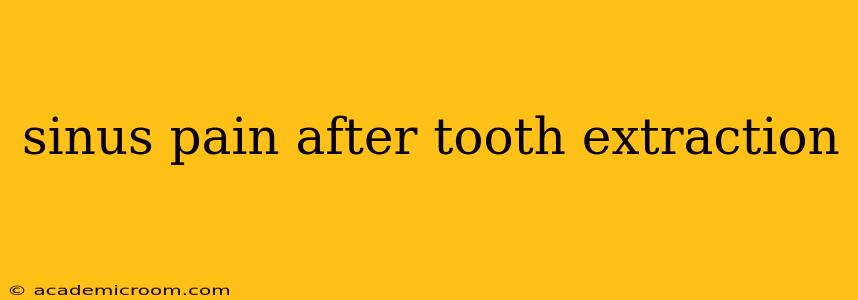Sinus pain after a tooth extraction is a common and often unsettling experience. The proximity of your upper teeth to your sinuses means that extraction in this area can sometimes lead to complications involving the maxillary sinuses. Understanding the causes, symptoms, and treatment options is crucial for managing this discomfort and ensuring a smooth recovery. This comprehensive guide will explore everything you need to know about sinus pain following tooth extraction.
What Causes Sinus Pain After Tooth Extraction?
The most common cause of sinus pain following an upper tooth extraction is a sinus perforation. This occurs when the tooth socket, during the extraction process, connects with the maxillary sinus. This connection allows air or, worse, infection, to pass from the sinus into the socket, or vice-versa. The resulting inflammation and pressure in the sinus cavity lead to pain, often described as a dull ache or pressure in the cheekbone area.
Other less common causes include:
- Pre-existing sinus infection: If you had a sinus infection before your extraction, the procedure might exacerbate the existing inflammation, leading to more severe pain.
- Dry socket: While not directly causing sinus pain, a dry socket (alveolar osteitis) – a painful complication where the blood clot in the extraction site dissolves prematurely – can indirectly contribute to discomfort by increasing the risk of infection, which may then spread to the sinus.
- Sinus pressure changes: Changes in air pressure, like those experienced during air travel, can also increase sinus pressure, making existing discomfort worse.
How Do I Know If My Sinus Pain Is Related to My Tooth Extraction?
The location and nature of the pain are key indicators. Pain associated with a tooth extraction and sinus involvement is typically felt in the cheekbone area, around the eye, and sometimes radiating towards the forehead. It’s often accompanied by:
- Facial swelling: Swelling in the cheek or around the eye is a common sign of sinus involvement or infection.
- Headache: Pressure in the sinuses can trigger headaches, sometimes localized to one side of the head.
- Fever: If infection is present, a fever might develop.
- Nasal congestion and discharge: You might experience nasal congestion or a yellowish or greenish nasal discharge.
What Should I Do If I Experience Sinus Pain After Tooth Extraction?
If you experience sinus pain after a tooth extraction, contact your dentist or oral surgeon immediately. They can assess the situation and recommend the appropriate treatment. Delaying treatment can worsen the condition and increase the risk of complications.
What are the treatment options for sinus pain after a tooth extraction?
Treatment depends on the cause and severity of the pain. Options include:
- Antibiotics: If an infection is suspected, antibiotics are prescribed to combat the bacteria.
- Pain relievers: Over-the-counter pain relievers like ibuprofen or acetaminophen can help manage pain and inflammation. Your dentist might also prescribe stronger pain medication if necessary.
- Nasal decongestants: These can help relieve pressure and congestion in the sinuses.
- Saline nasal rinse: Rinsing your nasal passages with a saline solution can help clear out mucus and debris.
- Surgical intervention: In rare cases, where a large perforation is present or other complications arise, surgical intervention might be necessary to close the opening between the sinus and the extraction socket.
How Can I Prevent Sinus Pain After Tooth Extraction?
While not always preventable, taking certain precautions can reduce the risk:
Can I prevent a sinus perforation during tooth extraction?
The risk of sinus perforation is inherent in upper molar extractions; however, experienced oral surgeons and dentists employ techniques to minimize the risk. Choosing an experienced practitioner is vital.
Are there specific things I should do after my extraction to minimize the risk of sinus issues?
Following your dentist’s post-operative instructions diligently is crucial. This includes:
- Avoiding blowing your nose forcefully: This can increase pressure in the sinuses and potentially push infection into the socket.
- Avoiding smoking: Smoking hinders healing and increases the risk of infection.
- Maintaining good oral hygiene: Brush and rinse gently around the extraction site, as advised by your dentist.
- Eating soft foods: This minimizes strain on the extraction site.
When Should I Seek Immediate Medical Attention?
Seek immediate medical attention if you experience:
- Severe pain that is not relieved by over-the-counter pain relievers.
- High fever (over 101°F or 38.3°C).
- Increased swelling and redness.
- Pus or significant drainage from the extraction site.
- Difficulty breathing or swallowing.
Remember, this information is for general knowledge and does not substitute professional medical advice. Always consult your dentist or oral surgeon for diagnosis and treatment of any oral health concerns. Early intervention is crucial for managing sinus pain after tooth extraction and ensuring a swift recovery.
